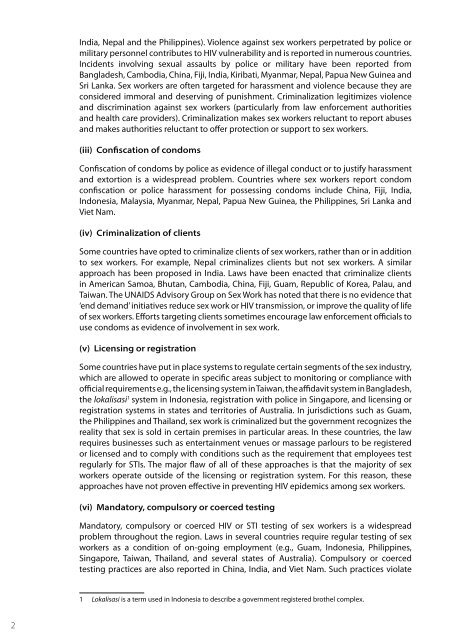SEX WORK AND THE LAW - HIV/AIDS Data Hub
SEX WORK AND THE LAW - HIV/AIDS Data Hub
SEX WORK AND THE LAW - HIV/AIDS Data Hub
Create successful ePaper yourself
Turn your PDF publications into a flip-book with our unique Google optimized e-Paper software.
India, Nepal and the Philippines). Violence against sex workers perpetrated by police or<br />
military personnel contributes to <strong>HIV</strong> vulnerability and is reported in numerous countries.<br />
Incidents involving sexual assaults by police or military have been reported from<br />
Bangladesh, Cambodia, China, Fiji, India, Kiribati, Myanmar, Nepal, Papua New Guinea and<br />
Sri Lanka. Sex workers are often targeted for harassment and violence because they are<br />
considered immoral and deserving of punishment. Criminalization legitimizes violence<br />
and discrimination against sex workers (particularly from law enforcement authorities<br />
and health care providers). Criminalization makes sex workers reluctant to report abuses<br />
and makes authorities reluctant to offer protection or support to sex workers.<br />
(iii) Confiscation of condoms<br />
Confiscation of condoms by police as evidence of illegal conduct or to justify harassment<br />
and extortion is a widespread problem. Countries where sex workers report condom<br />
confiscation or police harassment for possessing condoms include China, Fiji, India,<br />
Indonesia, Malaysia, Myanmar, Nepal, Papua New Guinea, the Philippines, Sri Lanka and<br />
Viet Nam.<br />
(iv) Criminalization of clients<br />
Some countries have opted to criminalize clients of sex workers, rather than or in addition<br />
to sex workers. For example, Nepal criminalizes clients but not sex workers. A similar<br />
approach has been proposed in India. Laws have been enacted that criminalize clients<br />
in American Samoa, Bhutan, Cambodia, China, Fiji, Guam, Republic of Korea, Palau, and<br />
Taiwan. The UN<strong>AIDS</strong> Advisory Group on Sex Work has noted that there is no evidence that<br />
‘end demand’ initiatives reduce sex work or <strong>HIV</strong> transmission, or improve the quality of life<br />
of sex workers. Efforts targeting clients sometimes encourage law enforcement officials to<br />
use condoms as evidence of involvement in sex work.<br />
(v) Licensing or registration<br />
Some countries have put in place systems to regulate certain segments of the sex industry,<br />
which are allowed to operate in specific areas subject to monitoring or compliance with<br />
official requirements e.g., the licensing system in Taiwan, the affidavit system in Bangladesh,<br />
the lokalisasi 1 system in Indonesia, registration with police in Singapore, and licensing or<br />
registration systems in states and territories of Australia. In jurisdictions such as Guam,<br />
the Philippines and Thailand, sex work is criminalized but the government recognizes the<br />
reality that sex is sold in certain premises in particular areas. In these countries, the law<br />
requires businesses such as entertainment venues or massage parlours to be registered<br />
or licensed and to comply with conditions such as the requirement that employees test<br />
regularly for STIs. The major flaw of all of these approaches is that the majority of sex<br />
workers operate outside of the licensing or registration system. For this reason, these<br />
approaches have not proven effective in preventing <strong>HIV</strong> epidemics among sex workers.<br />
(vi) Mandatory, compulsory or coerced testing<br />
Mandatory, compulsory or coerced <strong>HIV</strong> or STI testing of sex workers is a widespread<br />
problem throughout the region. Laws in several countries require regular testing of sex<br />
workers as a condition of on-going employment (e.g., Guam, Indonesia, Philippines,<br />
Singapore, Taiwan, Thailand, and several states of Australia). Compulsory or coerced<br />
testing practices are also reported in China, India, and Viet Nam. Such practices violate<br />
1 Lokalisasi is a term used in Indonesia to describe a government registered brothel complex.<br />
2
















